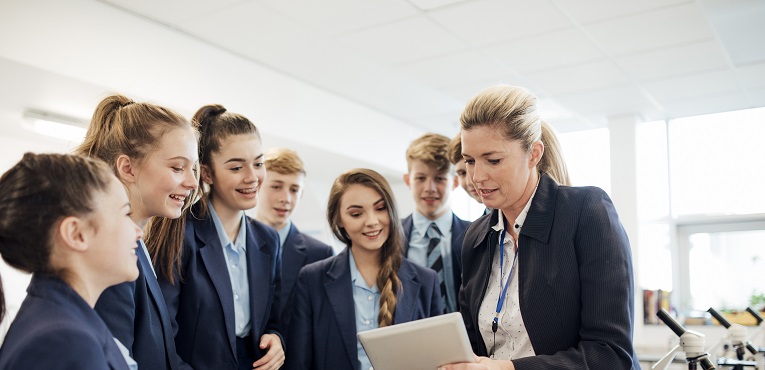Individualised and tailored curriculum offers to remove barriers to learning and enable all pupils to achieve

Quick links:
Information about the school
Rhyl High School is an English-medium 11-16 comprehensive school maintained by Denbighshire local authority. It serves the coastal town of Rhyl.
There are 1,147 pupils on roll. Around 31% of pupils are eligible for free school meals, which is above the national average (over three years) in secondary schools of 18.5%.
Nearly all pupils speak English as their first language and come from a white, British background. Very few pupils are fluent in Welsh. The percentage of pupils with special educational needs is around 18%.
The senior leadership team consists of the headteacher, deputy headteacher and six assistant headteachers.
Context and background to the effective or innovative practice
The school drives its vision of ‘being the best we can be’ by identifying and removing barriers to pupils’ learning. Leaders review the curriculum offer regularly to ensure that it meets the needs of pupils and supports them to thrive. Following periods of lockdown, leaders identified that pupils’ levels of engagement had reduced, and this had a negative impact on attendance and behaviour. As a result, in addition to the normal curriculum adaptations, leaders introduced a series of interventions and additional support systems to improve access to a relevant curriculum and improve pupils’ engagement.
Description of nature of strategy or activity
The school recognised that its provision to support learners to engage with school and post-16 pathways required significant change. Leaders analysed the existing systems, re-imagined the support needed, and created new teams within the school with the single objective of removing barriers to learning. From this, they identified three main areas of need and developed and refined a bespoke programme of intervention for each area:
- Hafan – This programme of intervention supports pupils for whom behaviour is a barrier to engagement.
- Achieve – This programme is designed to support pupils with additional learning needs.
- Wellbeing – This supports pupils for whom mental health and broader emotional health needs are barriers to learning.
Within each of the three programmes, pupils are offered a tailored and individual curriculum which balances the time spent in the support area with that spent in mainstream lessons. Each pupil’s individual curriculum addresses their need and is created in collaboration with them. For example, in Hafan, pupils receive direct intervention for behaviour as well as opportunities to build deep and positive relationships. This intervention influences long term behavioural changes and supports pupils to successfully engage with their learning.
With the expertise of dedicated staff, these programmes support the most vulnerable pupils to address their barriers to learning and fully integrate into mainstream lessons. Leaders ensure appropriate staffing in each area so that staff know the pupils well and have the time and capacity to both support the pupils and to challenge them be a better version of themselves.
In addition to the bespoke curriculum in each of the three main areas of need, the school offers all pupils opportunities for individualised curricular provision. For example, it offers curriculum opportunities run through sport, construction, hair and beauty via the school salon, and technology. These opportunities not only encourage and enthuse pupils to strive towards their future pathways, but they also develop social skills such as how to speak politely and create positive relationships with customers. This then translates in the way that they interact with their teachers and peers.
The school has also developed a behaviour team. This team is available throughout the day and deals quickly with incidents of poor or off task behaviour in lessons and ensures that pupils return to learning quickly and effectively.
To further strengthen the curriculum, the school provides a comprehensive programme of activities to support all pupils with their social and emotional needs. This provision is wide ranging and includes for example, school-based youth workers and the well-being team who deliver regular well-being activities to develop pupils’ resilience. In addition, bespoke programmes are offered, for example, for bereavement support, anger management and to support pupils to interact and communicate with others effectively.
What impact has this work had on provision and learners’ standards?
Rhyl High School staff know their pupils very well. Pupils receive extensive tailored support for their individual needs through a comprehensive and well organised support system. All pupils are provided with an individualised and tailored curriculum, and this was seen as a notable strength during the recent Estyn inspection.
The engagement, behaviour, and attendance of pupils has improved. Pupils previously identified as being at risk of exclusion and disengagement are now more engaged and increasingly, they successfully complete mainstream provision and access post-16 provision or gain employment.
How have you shared your good practice?
Rhyl High School has shared its offer within the local authority and region. The school was a part of the school partnership programme within the regional consortium. The school has established a working group of schools from a similar context to proactively work together to enable recovery from the pandemic in challenging settings.